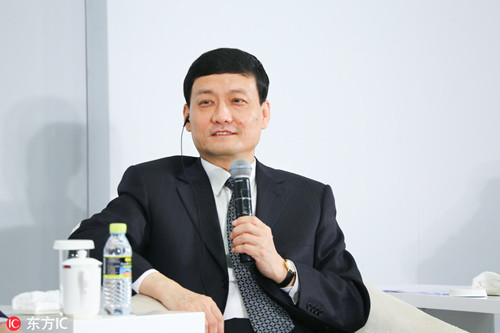Nation adopts measures to lift real economy


Xiao Yaqing, chairman of the State-owned Assets Supervision and Administration Commission. [Photo/IC]
Second batch of central SOEs chosen to optimize capital use via reforms
China will select 10 centrally-administered State-owned enterprises as the second batch of pilot State-owned capital investment and operating companies to optimize capital use via diversified forms of operation, the country's top regulator for State assets said on Monday.
The government will encourage them to establish independent financial companies and apply for financial licenses to better serve the real economy by using their own capital, said Xiao Yaqing, chairman of the State-owned Assets Supervision and Administration Commission.
"SOEs of this kind must focus on their main business to prevent risks and standardize their financial operations, while arbitrage moves are strictly prohibited," said Xiao. "They will deploy more resources into key industries, research areas and regions to boost China's development capabilities."
He said that provincial-level SOEs can also conduct similar activities to further expand their operational scope in order to gain more growth momentum.
The pilot companies must be solely State-owned and can be set up either via restructuring or new registration, according to guidelines on promoting the pilot reform of State capital investment and operation companies released in July.
State capital investment companies will make investments in line with national strategies and to increase their industrial competitiveness while State capital operation firms will mainly be tasked with enhancing returns and operational efficiency, said Meng Jianmin, SASAC's vice-chairman.
Eager to improve the optimal distribution of State-owned capital and further compete with other global giants, SASAC released the first batch of 10 pilot State-owned capital investment and operating companies in 2016.
The first two pilot central SOEs, China Chengtong Holdings Group and China Reform Holdings Corp, with established State-owned funds, are responsible for financing SOEs' structural adjustments, as well as their transformation and upgrading.
The pilot programs for the other SOEs, such as COFCO and China Poly Group Corp, mainly focus on management and regulatory reform. Capital and asset operation will be distinct in the pilot SOEs, and the future trend of reform will be toward "small headquarters, big industry".
Zhu Bixin, president of China Chengtong, said the group's next move is to carry out market-oriented equity management and operation, including actively making use of SOEs' stock transactions in the Hong Kong Stock Exchange and introduce overseas capital into SOE reform.
The government will further deepen SOE reforms by clearly separating the rights of ownership and operation in all pilot programs. Their decision-making power should be based on capital and the market, instead of government branches, said Xu Hongcai, assistant minister of finance.
The SOEs must be aware that these new platforms do not exist either to increase debt or simply put capital into the financial market, said Xu, pointing out that competently managing their capital and reducing debt were also key for them to remain competitive.
SASAC said it would continue to enhance the authority of management boards, the professional manager system, differentiated pay allocation reform and mixed ownership reform to inject more vitality and anti-risk capacity into SOEs.
China currently has 96 central SOEs, down from 196 in 2003, as the central government has restructured them to improve their efficiency and competitiveness.







